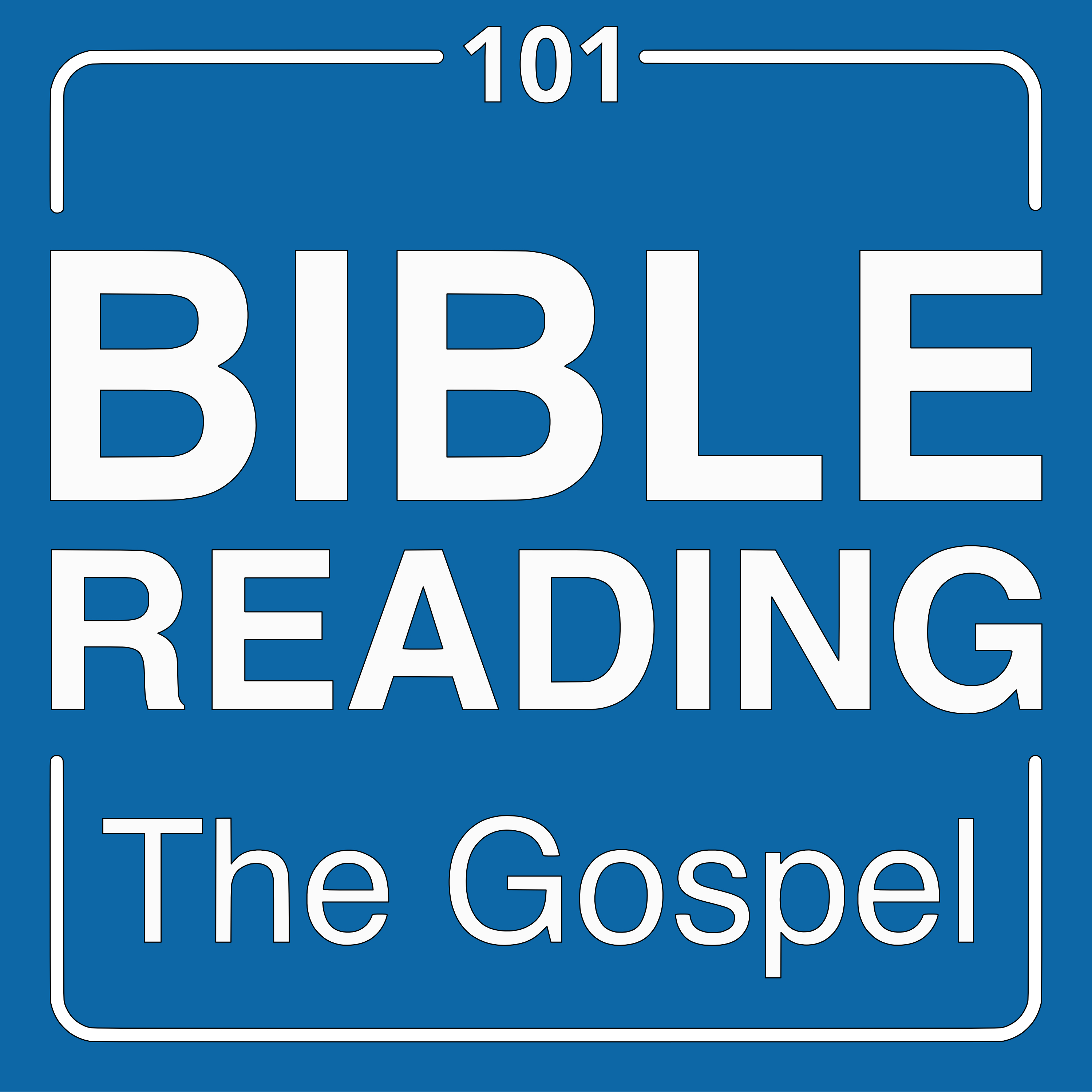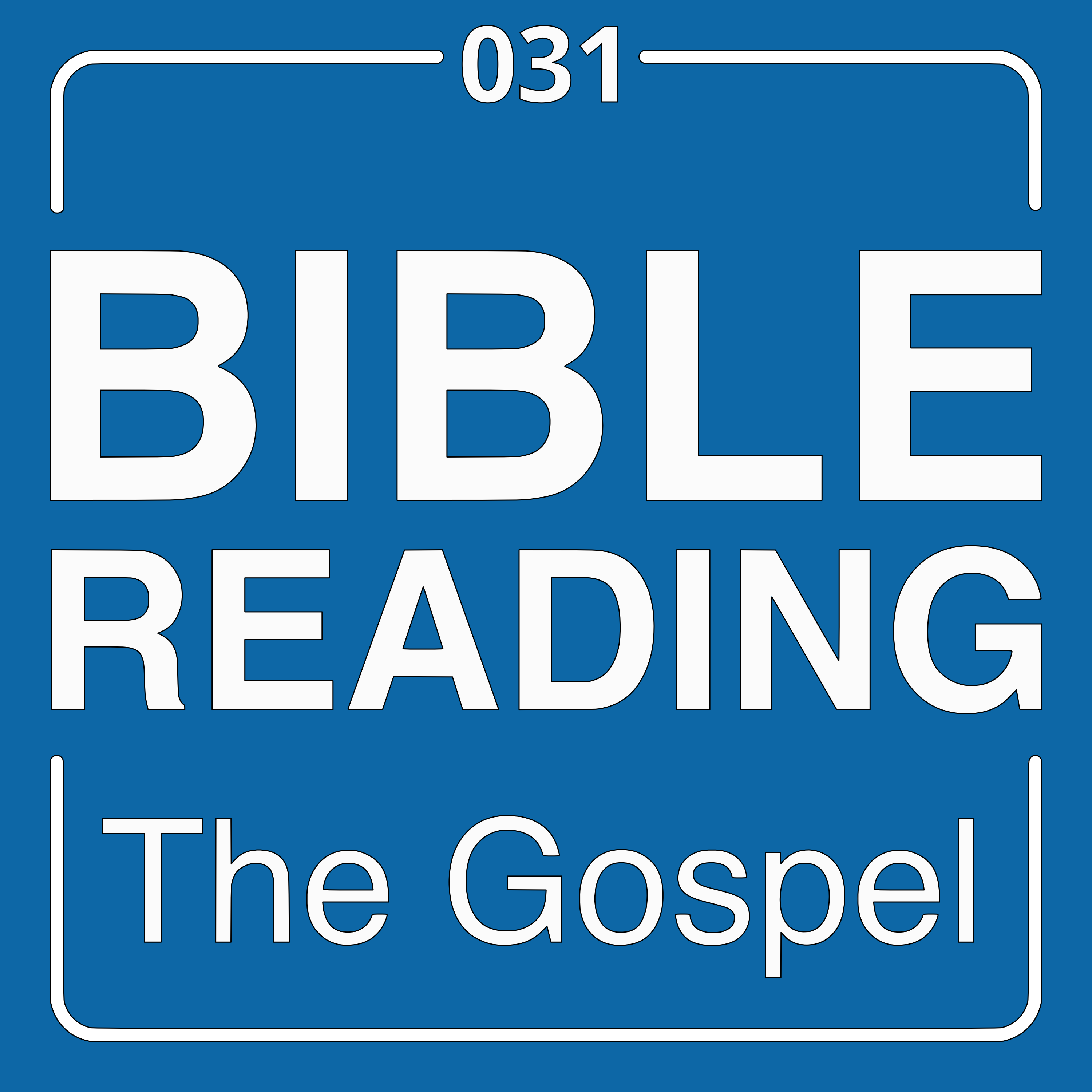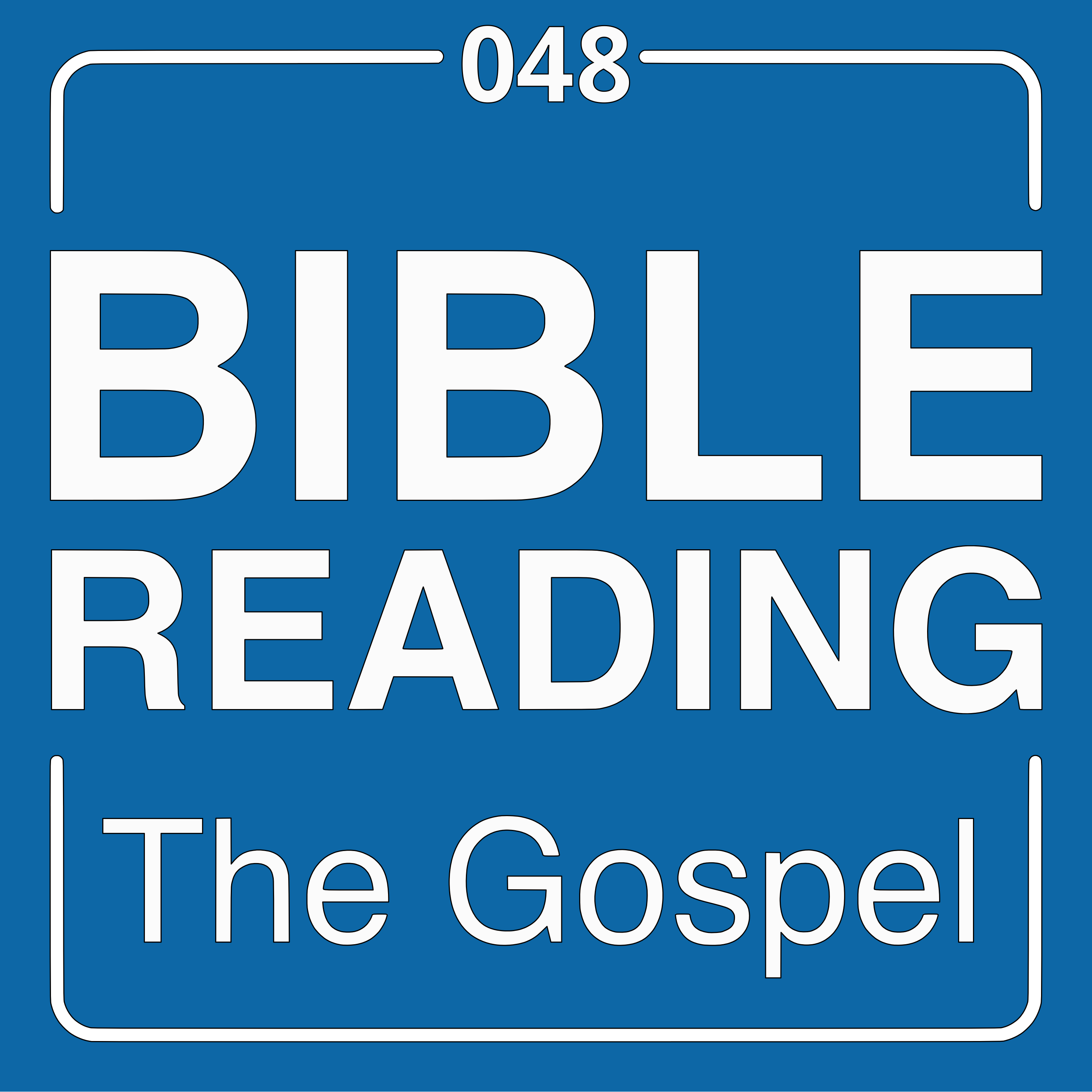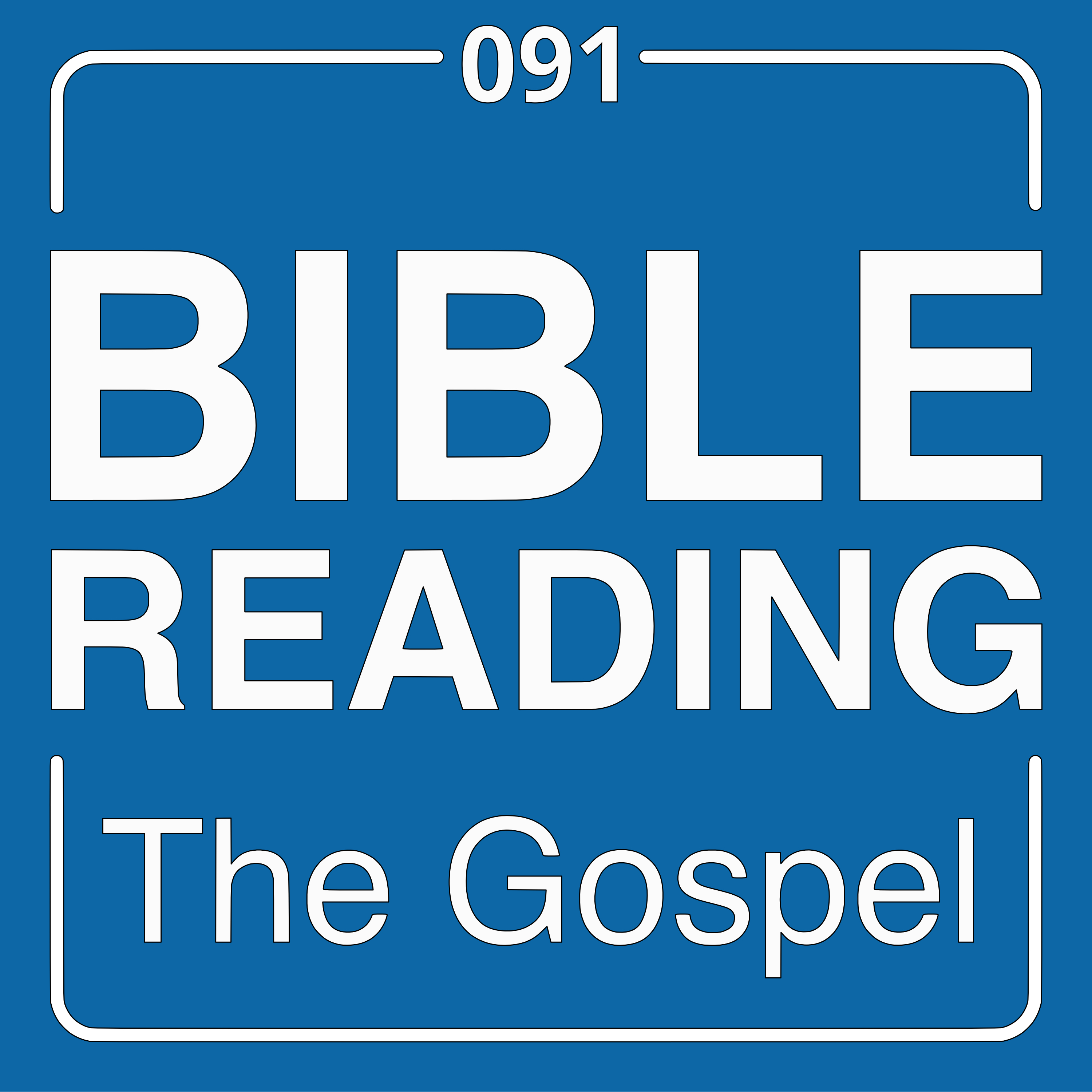Episode Transcript
[00:00:24] Speaker A: Hi, I'm Josh.
[00:00:25] Speaker B: And I'm Gabriel.
[00:00:26] Speaker A: And today on reading the Gospel, we are studying the event jesus, the good shepherd and the door. This is found in John, chapter ten, and we'll be reading from verse one to verse 21. Follow along with us as we read.
[00:00:43] Speaker B: Truly, truly, I say to you he who does not enter the sheepfold by the door but climbs in by another way, that man is a thief and a robber. But he who enters by the door is the shepherd of the sheep.
To him the gatekeeper opens, the sheep hear his voice and he calls his own sheep by name and leads them out.
When he has brought out all his own, he goes before them and the ship follow him. For they know his voice. A stranger. They will not follow, but they will flee from him, for they do not know the voice of strangers.
This figure of speech Jesus used with them, but they did not understand what he was saying to them.
[00:01:37] Speaker A: So Jesus again said to them, truly, truly I say to you I am the door of the sheep. All who come before me are thieves and robbers but the sheep did not listen to them. I am the door. If anyone enters by me, he will be saved and will go in and out and find pasture. The thief comes only to steal and kill and destroy. I come that they may have life and have it abundantly. I am the good shepherd. The good shepherd lays down his life for the sheep. He who is a hired hand and not a shepherd who does not own the sheep sees the wolf coming and leaves the sheep and flees. And the wolf snatches them and scatters them. He flees because he is a hired hand and cares nothing for the sheep. I am the good shepherd. I know my own and my own know me, just as the Father knows me. And I know the father. And I lay down my life for the sheep. And I have other sheep that are not of this fold. I must bring them also, and they will listen to my voice. So there will be one flock, one shepherd. For this reason, the Father loves me, because I lay down my life that I may take it up again. No one takes from me, but I lay it down of my own accord. I have authority to lay it down, and I have authority to take it up again. This change I have received from my Father.
[00:03:17] Speaker B: There was again a division among the Jews because of these words. Many of them said, he has a demon and is insane. Why listen to him? Others said, These are not the words of one who is oppressed by a demon. Can a demon open the eyes of the blind?
[00:03:40] Speaker A: So in this event that we're covering, jesus here is liking himself to the shepherd, to the door.
We are the sheep. And our goal is to enter through the gate. But there are others who enter through over the wall and come into the wall. Who are these others that Jesus is talking about?
[00:04:04] Speaker B: I think that he's referring to the Jewish leaders of the time, primarily to the Pharisees, because the Pharisees consider themselves as being the shepherds of the people.
But they were either like the hired shepherds. When the hired shepherds see the wolf, they run away.
They do not give their life for the sheep or they are like thieves and robbers jumping over the fence of the sheephold with a purpose to destroy, to devour, to take advantage and so on.
[00:04:44] Speaker A: This is what has scared me about being a pastor, being someone called to share the good news of God.
What if I get it wrong? And that's why for me, I try not to be that shepherd at the gate. I try to point people to the good shepherd, to Jesus. And this is why we tell our listeners to test what we say and to study for themselves and to read and to follow along, that they're learning themselves because it is scary.
[00:05:19] Speaker B: As the apostle Peter says, jesus Christ is the shepherd.
As pastors, we are under shepherds.
Yeah.
[00:05:30] Speaker A: And so, you know, he likens himself to the door.
I love this statement where he says, other sheep have I that are not of this fold. They also must.
You know, so often we think we have it right and we're the righteous people, we're the saved people, because we're living up to our understanding.
[00:05:54] Speaker B: If you want to have Jesus, you have to join.
[00:05:57] Speaker A: Yeah, yeah. My church is the way to salvation.
But even in Revelation, at the end, Babylon, which is the apostate, the angel comes and says, come out of her my people.
And so God has his people everywhere.
And I think that's beautiful.
[00:06:21] Speaker B: I like to connect this story with chapter nine from the Book of Amos. We studied last year in Bible prophecy.
In Amos, chapter nine, we don't have just one Exodus, right? Like the Book of Exodus, we have three Exoduses, all of them orchestrated by God. We don't have just one remnant. There is a remnant in any nation called after God's name.
And the purpose of the work of the Holy Spirit today is to grow those people to maturity in one day, right before the second coming of Jesus Christ, to gather together all these remnants and to have that people of God waiting for the second coming of the Lord.
[00:07:10] Speaker A: Verse 17, the Bible says, for this reason, the Father loved me because I laid down my life that I may take it up again.
The Father not love Jesus before he laid down his life.
[00:07:24] Speaker B: I think that God speaks in human terms to help us understand.
And I'd like to connect this verse to that beautiful statement in John, chapter three, verse 16. For god so loved the world that he gave his only son, that whoever believes in him shall not perish but have everlasting life in a specific way. God loves us so much that he would love Jesus even more if he died for our sins.
[00:08:02] Speaker A: So when we talk about the agape love, the perfect love, does that mean before Jesus died on the cross, god only loved the Father, only loved Jesus? Maybe 80% agape love.
[00:08:16] Speaker B: That agape love is always 100%. God loves us to the fullest. Look, chapter six, verse 35 the most high is kind. Remember that loving kindness of God to the ungrateful and even to the evil one, the love of God in principle that agape love is flowing from heaven towards us full speed and full bandwidth. It's always 100%. But there is another dimension of love that we experience in our relationship with God when we learn to trust Him. And that experiential love might have different levels, not that much from God's perspective, as much as from our part.
[00:09:04] Speaker A: That experiential love comes through relationships and experiences.
When you and I went and hiked Long's Peak, we went from friends, people who shared stories together, shared out past together, to more bonded relationship where we're closer, we trust each other more because we went through this experience together. And I think this is true. As a father, I love my kids 100%, I've always loved my kids 100%. But as I go through life and experience life with them, as I experience their kindness and their acts and their humanity, those experiences increase that love. So 100% becomes more, even though it's 100%. And I think this is what this is talking about, that Jesus going through this act of sacrifice. God already loved Jesus fully, the father loved Jesus fully, but it just increases the experience.
[00:10:15] Speaker B: I would like to apply this gospel principle to a family, the way you talked about your own family.
Let's talk about a mom who is ready to not only to stay up night after night and take the kids to the doctor and to the best stores and the best playgrounds and after school activities, but she is ready to really die for her kids.
And we can say that God loves those moms even more as they are ready to sacrifice themselves for their kids. Yeah. And this is not a difference in the agape universal love of God because that was valid in previous generation when these moms were kids and God loved those kids so much that loved their moms even more when they are ready to sacrifice. And this is a perpetual story in every generation.
[00:11:16] Speaker A: And before we move into our questions, I think we need to talk about the flip side.
Does God love us less when we do bad? And I would liken that again to me as a father and my kids, when my kids do bad things, it's not that I love them less I might be disappointed, but the love does not decrease. And I think that's true with God, that in our lives. It's not like we have to get to a place before God loves us, he loves us now.
So what is this passage telling us about God?
[00:11:54] Speaker B: I was listening to you reading and even listening to myself and I realized for the first time that a keyword, maybe the keyword of this chapter is no is being repeated. The shepherd knows his sheep and primarily the sheep knows the shepherd. There is a close relationship, there is a bonding. The sheep will never follow a stranger, they will follow only the shepherd they know. So this knowledge of God is the essence of salvation of the Christian faith. In fact, in John chapter 17, Jesus says and this is the everlasting life. The essence of the everlasting life is to know you as a true God and Jesus Christ.
The same idea of knowledge goes back in Matthew chapter seven in the Day of Judgment when some people will go to Jesus who executes the judgment that day and say, lord, Lord, it seems that you made a mistake. You put us on the left side then do you remember that we preach the gospel in your name, we perform miracles in your name. And Jesus would tell them, I never knew you.
Knowing God and being known by God is essential. It is the core, the essence of our salvation.
[00:13:27] Speaker A: And this takes us back to that experiential knowledge. As we experience God in our lives, our love for him grows as well. We know him more. And so we can experience God through reading the scriptures. We can experience God by being in community with other people, by even being in nature. And all these increase our love for God. How is this passage speaking us today and what are we going to do about it?
To me, as I look at this, it ties into what we've just been talking about, that there's a part for me to play as a sheep, to know the shepherd, not to be running away from the flock, not to be wanting to go off on my own, but to wanting to be around the shepherd.
And I think it calls me back to spending that time.
It's so easy to even as a pastor, to fill my life with busyness of the job of being a pastor and not to have those experiences with God, but to make that time that I need to make that time to have that time with God.
[00:14:41] Speaker B: I remember I was driving by a florist and it was a sign on top of the shop saying life is the best teacher, providing you are the best student. So I like to apply this to our reading today. The Lord is the best shepherd, provided that we are the best sheep. Yeah, let's pray.
[00:15:04] Speaker A: Father God, I thank you that Jesus is the good shepherd, that he is the door, the way to eternal life, and that that gift of eternal life has been given freely.
Father, I pray that we, as the sheep, will experience you, that we will experience Jesus in our life, that we will make time daily, and that we will draw closer to you. We ask these things in his name. Amen. Amen.



